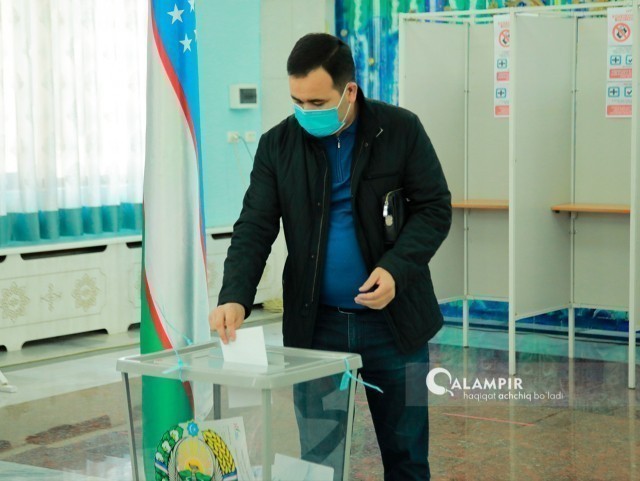The law on referendums is amended ahead of constitutional reforms in Uzbekistan
Local
−
18 June 2022 6644 5 minutes
The law “On referendums of the Republic of Uzbekistan” was amended. The document was adopted by the Legislative Chamber on 11 June and approved by the senate on 13 June.
According to the amendments to Article 1 of the law, decisions taken at a referendum may be revoked or amended only at a referendum, unless distinctive norms are stipulated in the adopted decisions.
According to the amendment to Article 8, interested organizations and citizens' initiative groups notify district commissions of their observers 10 days before the referendum (before the term was 15 days).
The amendments to article 9 now allow observers to monitor the installation of booths or secret voting rooms as well as the registration of citizens.
The article was also supplemented by an additional clause that observers must notify the precinct referendum commission at least three days before their visit to polling stations established in military units, places of detention, and deprivation of liberty.
Article 18 of the law (powers of the Central Electoral Commission) previously provided for the consideration and adoption of decisions by the CEC on applications and complaints against decisions and actions of referendum commissions. The commission will now consider appeals of citizens and other referendum participants and take decisions on them, except for complaints about actions and decisions of referendum commissions.
Other powers of the Central Election Commission not regulated by this law shall be regulated by other laws on the election.
The District Referendum Commission shall be formed by the Central Election Commission not later than 10 days after the announcement of the decision to call the referendum, consisting of not less than 8-18 members (previously the number was 9). The chairman, deputy chairman, and secretary of the District Referendum Commission shall be elected from among its members at the meeting of the commission.
Candidates to the district referendum commissions shall be discussed at the meetings of the councils of people’s MPs and shall be recommended for approval by the CEC (Central Electoral Commission) no later than seven days after the announcement of the decision to call a referendum.
According to the amendments to Article 23, members of political parties, governors (khokims) of regions (oblasts), districts and cities, and officials of prosecutor’s offices and courts cannot be members of district and precinct referendum commissions.
In addition, if more than half of the members of the precinct referendum commission are persons working for the same organization, they may not be recommended to the commission, except for electoral (referendum) commissions established under diplomatic and other offices of the Republic of Uzbekistan abroad, in military units, in sanatoriums and resorts, hospitals and other inpatient medical institutions, places of detention and deprivation of liberty.
Article 24 provides for the remuneration of members of referendum commissions for the reimbursement of transport, food, and other expenses in the amount indicated in the cost estimates for the preparation and conduct of the referendum.
According to the amendments to Article 25, citizens, as well as observers, can appeal decisions of referendum commissions within 5 days after the decision is made.
The decisions made over the decisions of the CEC may be appealed to the Supreme Court within 5 days after the decision. Complaints will be considered within 3 days of receipt; if there is less than 6 days left before the referendum, the process will be fast-tracked. Complainants have the right to participate directly in the examination of the complaint.
Chapter IV is supplemented by article 25-1 (Procedure for consideration of appeals of individuals and legal entities by referendum commissions):
Referendum commissions shall, within the limits of their powers, consider petitions of individuals and legal entities during the referendum on violations of the requirements of this law or other issues related to the organization of a referendum, and shall inspect these petitions, provide them with a written response within three days, and not less than six days before the referendum or on voting day, without delay to consider and respond to petitions, except complaints against actions and decisions of referendum commissions.
Applications must be registered in the register.
The chairman of the Referendum Commission shall convene a meeting of the relevant commission for consideration of the application and adoption of a decision on it within the time limits established by this law and shall hold its session. Interested persons may be invited to the meeting.
An appeal to a precinct commission conducting a referendum that is not within its competence to resolve the issues raised shall be sent within three days with notification to the applicant to the appropriate bodies.
Members of referendum commissions who have considered the application shall inform the applicant of the results of its consideration and the adopted decision.
The amendment to article 27 provides that the amendment to the list of the voters shall be suspended five days before the referendum.
According to Article 35-1 (early voting), the voter shall make a decision and leave the filled ballot paper for a referendum in a sealed envelope stored in the safe of the corresponding precinct commission. When attaching an envelope, the signatures of two members of the precinct commission shall be sealed with the seal of the commission and the signature of the voter. The requirement for the voter’s signature was removed from the article.
The law is also supplemented by articles 35-2, which regulate voting at the place of residence of a citizen abroad.
According to Article 37, a copy of the protocol of additional voting shall be immediately posted in the building of the district referendum commission for at least 48 hours.
Under article 41, the decision previously taken by referendum was compulsory throughout Uzbekistan and did previously require approval by the Uzbekistan authorities. Now if it is necessary to adopt a normative legal act for the implementation of this decision, the state body within its competence within 10 days from the date of entry into force of the decision presents a list of documents and normative legal acts on the issue and the period their training must be specified.
Live
All07 January

